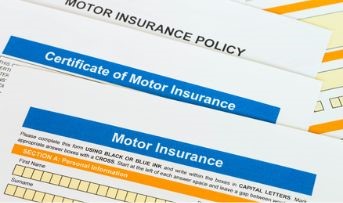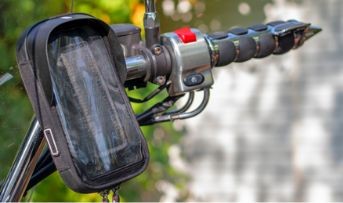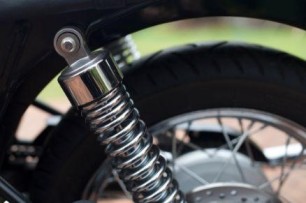General Insurance Blogs, Articles & Updates by - Magma HDI
Have us call you
- RENEW YOUR POLICY
- BUY NEW POLICY

Tips to renew the vehicle fitness certificate of your old two-wheeler
As two-wheelers turn old, their performance and the quality of their internal parts start to deteriorate. Significantly, the engine gets severely affected, which leads to more fuel consumption and harmful emissions. Such two-wheelers are then considered not fit to ride.
If you own an old two-wheeler and wish to ride it on Indian roads legally, then you need to have a fitness certificate for it. The Government of India has made the renewal of fitness certificates convenient by introducing the 'Parivahan Sewa portal' that operates entirely online.
Applying online is a hassle-free process as you only need to fill out a form and submit all the required documents to your local Regional Transport Office (RTO) for verification.
In today's post, we will take you through the step-by-step process of renewing your two-wheeler's fitness certificate online:
1. Go to the official VAHAN website. Begin the renewal process by going to 'Online Services' and selecting 'Vehicle Related Services.'
2. After that, choose your state. Next, click on 'Application for Fitness Certificate' and enter your bike's registration number and chassis number.
3. Following that, generate an OTP using your registered phone number. Enter the one-time password (OTP) that you received on your phone to proceed with the process.
4. Go to the 'Payment' option and complete the transaction to start the renewal fee transfer.
5. After completing these procedures, take the appropriate documentation to your local RTO to complete the two-wheeler fitness renewal process. Officials at the RTO will perform a fitness test on your bike and verify your documents to complete the process.
Steps to renew fitness certificate of two-wheeler offline.
Here is how you can acquire a fitness certificate for your bike offline:
1. Visit the local RTO
2. Fill out an application for a fitness certificate renewal
3. After that, attach the required documents to the application
4. To finish the procedure, pay the RTO the renewal fee for your bike fitness certificate
The officers will review your submitted documents and schedule an appointment for your bike's inspection. You must arrive at the designated centre on time. Here, your two-wheeler will be thoroughly investigated, and if it qualifies the desired parameters, you will be issued the fitness certificate for your bike.
Note: Although the renewal process is the same for both two and four-wheelers, the fee differs for both types of vehicles.
Complete list of documents you will require:
• Tax token
• Registration certificate
• Vehicle permit
• Pollution Under Control Certificate or PUCC
• Valid two-wheeler insurance policy papers
• Passport size photo
According to the Motor Vehicles Act of 1989, a vehicle's registration is only acceptable if a valid Vehicle Fitness Certificate accompanies it. Commercial and private automobiles are required by law to have a fitness certificate. Failing to submit a fitness certificate carries a punishment of Rs. 100. For consecutive violations, the fine is increased to Rs. 300. If you don't have a valid fitness certificate, you'll be fined between Rs. 2,000 to 5,000.
The law also mandates two wheeler insurance India. Failing to have both these documents can lead to hefty fines. Save yourself from the trouble and get the fitness certificate and insurance today. You can only enjoy riding your two-wheeler if you keep the required documents up-to-date and avoid landing yourself in any unwanted trouble.
Click HERE to buy the best two wheeler insurance India.
Disclaimer: The information provided above is for illustrative purposes only. To get more details, please refer to policy wordings and prospectus before purchasing a policy.

Wondering why your motor insurance premium is so high? Fuel may be the reason
While electric vehicles are capturing the vehicle market, petrol and diesel-based cars still need to be put in trend. Maximum Indian citizens today own fuel-based vehicles, be it two-wheeler or a four-wheeler. But these fuel-based cars also have a history of superseding one another. Petrol cars have always been the favoured alternative amongst fuel-based vehicles.
Initially, diesel usage focused on heavy vehicles operated for commercial purposes like duty trucks, etc. But with the advancement of technology today, diesel vehicles have become widely popular and opted for daily use vehicles like passenger cars.
But do you know that your motor insurance premium changes for the type of car you use? Fuel may be the reason. Want to know how? Without any further delay, let’s get started.
1. How much is your car’s price:
Diesel-powered and petrol-powered cars are priced differently in the Indian market. Usually, the price of vehicles that have diesel-powered engines is high when compared to their petrol-powered counterparts. A higher price directly reflects on the motor insurance and premium prices.
Therefore, the more expensive a car you have, the higher the motor insurance premium you have to pay. So, figure out the maintenance and premium charges you will have to pay in the future and create a budget in advance so that you do not get surprises of additional premiums like motor insurance.
2. Repair influences the premium charges:
Yes! Even the cost of repair influences the motor insurance premium prices. The repair charges for diesel-based vehicles are much higher than those for petrol-based cars. Therefore, the company charges high premiums for your motor insurance to help cover the claims if you make any in the future. Similarly, if your car has expensive spare parts or is priced in the high-end range, the companies will charge you high motor insurance premiums.
This proves that fuel has a massive impact on premium charges. Having this information before you make any purchase will help you put things into perspective, especially budget-wise. Many factors should be considered when someone decides to purchase a car, one of which is the motor insurance, its premium charges, claims, add-ons, and other features which vary from one insurance provider to another.
3. Is your car fuel efficient:
Fuel efficiency is another influencing factor that determines higher motor insurance premiums. While petrol-powered cars have great starting and ignition power, diesel-based cars are beneficial for vehicles purchased to last longer.
4. Let’s have a look at the engine:
The engine capacity of your petrol-powered car is lesser than that of diesel-based cars, thus raising the motor insurance premium prices for diesel-powered vehicles. The better the engine capacity, the higher the premium. Who knew that fuel could be such a powerful influencing factor in the premium prices of motor insurance?
5. Cannot miss IDV (Insurance Declared Value):
If the market value estimation is high, the IDV will be increased, directly impacting the premium. Usually, the IDV of diesel-based cars is high, which leads to a rise in premium prices.
We hope this blog gives you a crisp and clear idea about your motor insurance premium charges. This will help you arrive at a decision or educate you about motor insurance and what factors impact the premiums which will come out of your pocket. And there is no doubt about how crucial it is to purchase motor insurance to protect your car and yourself against the financial burden.
Click HERE to learn more about motor insurance.
Disclaimer: The information provided above is for illustrative purposes only. To get more details, please refer to policy wordings and prospectus before purchasing a policy.

The only one-stop guide for motorcycle accessories you must always carry
When it comes to motorcycles, many accessories can enhance your riding experience. Whether a seasoned rider or a beginner, carrying certain accessories can significantly improve your comfort and safety. When you have the proper accessories, riding a motorbike is an exhilarating, even more, pleasurable experience.
This blog will discuss the one-stop guide for motorcycle accessories you must always carry. Without any further delay, let's get started. The following list of some essential motorbike accessories should be on your must-have accessories list.
1. Reduce the minor vibrations through hand grips:
Hand grips seem like a small addition, but they can significantly enhance your riding experience. Do you know how annoying vibrations on your handlebars are; maybe you've ever felt them. A nice set of hand grips can lessen vibrations and improve the smoothness of your riding.
2. Protect your motorcycle using disc brakes:
You worry about someone taking your motorcycle when you leave it parked in an isolated location. A disc brake lock can add a level of security for you. Although some might counter that disc brake locks can be broken, having an extra layer of protection helps prevent burglars. A disc brake lock that beeps if someone tries to tamper with it can also be a good option.
3. Use your phone conveniently with a phone holder with a charger:
A motorcycle phone holder is essential for riders who want to use GPS properly while riding. A sturdy phone holder with a charger helps you to navigate your route without taking your hands off the handlebars. You may use this holder to mount your phone and access GPS.
4. Safeguard your shoe for the convenient operation of your motorcycle by using a proper gear shift pad: The lack of proper rubber padding on gear change levers might cause long-term damage to your shoes. Your shoes will be protected and last longer if you use a rubber gear shift pad. Choose a shift sock that you may place on the gear lever if you do not want to wear the shoe pad.
5. Pack your things in a motorcycle tank bag:
Carrying small items while riding is inconvenient, but a tank bag can help. It would be best to consider using the Tank Bag to transport your goods. It features a clear map pocket where you can keep your phone. The material is sturdy and durable and comes at pocket-friendly prices, so you don't burn through your savings.
6. Purchase cleaner and chain lube for lubrication:
For the chain sprockets on your motorcycle to last a long time, your chain must be kept clean and lubricated. In India, most mechanics lubricate the chain using motor oil that has been burned, which might harm your chain. Buy a better chain lube set, including a handy cleaning brush that simplifies cleaning.
7. Riding comfort with an air suspension seat:
When you ride a long distance on bad roads, you may experience back pain and discomfort. You can avoid the unpleasantness of terrible roads by using an air-suspension seat. This seat can be utilised when your passenger is an older adult, a pregnant woman, or someone with back issues.
You can carry these few accessories to make your ride smooth and enjoyable. Now, let's talk about safety! You need to purchase motor insurance to protect your vehicle against heavy and unprecedented damage and save yourself against the monetary stress of getting your motorcycle repaired. Once you explore the options and get the best motor insurance to cater to your needs optimally, you must also remember to renew bike insurance online at equal intervals to keep availing of the benefits.
Click HERE to learn more about how you can renew bike insurance online.
Disclaimer: The information provided above is for illustrative purposes only. To get more details, please refer to policy wordings and prospectus before purchasing a policy.

What are the signs that show suspension problems in bikes
As a bike owner, you know that your vehicle requires routine maintenance, tyre replacements and bike insurance renewal. But how often do you consider your vehicle's suspension? Your suspension system works hard to make your ride comfortable by smoothing out bumps in the road and keeping the wheels on the ground. Bike owners often overlook that part when it comes to repairs. But how can you know if there's a problem with your bike's suspension?
Here are some of the most common signs of suspension issues. Keep in mind that these are extreme instances, and your suspension system may be subtler. It all depends on the bike's handling.
1. Unreasonable bumpiness:
The primary function of suspension is to facilitate a smooth and comfortable ride, even on bumpy roads. If you start to feel every bump in the road, it's a clear sign that your shock absorbers are failing and should be replaced. Conducting a bounce test can help you check the efficiency of the absorbers. Do this by placing your entire weight on the back of your motorcycle. Release the vehicle and count how many times it bounces. If it bounces more than three times, there is an issue with your suspension.
2. Thud or rattle from suspension:
In most cases, your shock absorbers should be almost noiseless when in use. It's a concern if it starts making more noise than usual. The seal separating the damping oil from the pressurised nitrogen charge may be broken, resulting in a noise during compression and rebound. A knocking noise is even more concerning since it indicates that something inside the shock collides with something it shouldn't. If you continue to ride it, the damage will be consequential - and costly to repair.
3. Oil leak:
Oil coming from the air seals or adjusters is the first sign of an oil leak, but it usually leads to a lack of damping soon after. As the oil accumulates dirt, it may create a horrible black sludge accumulating around the end of the shock shaft. If you notice this, it's only a matter of time before your shock is damaged.
4. Lack of damping:
Even the most mechanically uncaring riders should be aware of this, but that isn't often the case. You might find it difficult to control your bike while riding. Check if the rebound and compression damping settings are still working correctly. If they don't seem to be making a difference, it's time to get it checked out.
These are some of the most prevalent suspension issues. Regularly check your suspension system, do some maintenance or replace parts if required. Neglecting your bike's suspension problems can adversely affect its performance and functioning. It can also impact the rider's physical wellbeing due to jerks that gradually result in back pain and other health issues.
Besides regular maintenance, bike insurance is both a legal requirement and a wise investment. It protects you from losses that may occur due to an accident or theft, and it can even cover the expenses involved in your bike's repair and servicing.
Click HERE to buy the best bike insurance that fits your needs.
Disclaimer: The information provided above is for illustrative purposes only. To get more details, please refer to policy wordings and prospectus before purchasing a policy.


